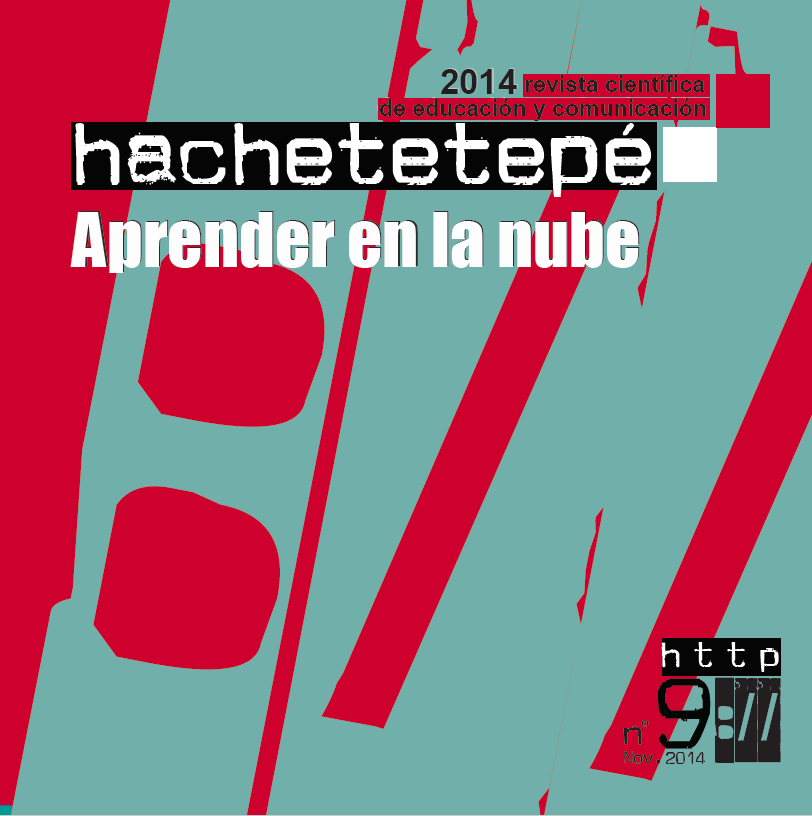The MOOCs: Innovation to disruptive new business model in higher education

Info
Abstract
The MOOCs have appeared in our higher education sector as a new model of education that has broken into our system as a solution to some of the same problems. This article explores how MOOCs been considered a disruptive innovation and how they have happened in higher education, to the extent that is rare Spanish University currently has not designed its own MOOCs or is currently thinking about it. This article comes after an investigation in which MOOCs courses in Spain, for which a list of categories is constructed analyzes aimed know what technical structure, aesthetics, navigation, content and skills development for employment form of these courses in Spanish and Spanish universities.
Keywords
Downloads
How to Cite
License

This work is licensed under a Creative Commons Attribution-NonCommercial-NoDerivatives 4.0 International License.
Those authors who have published with this journal, accept the following terms:
- They will retain their copyright and guarantee the journal the right to first publication of their work, which will simultaneously be subject to the Creative Commons Attribution License . They may be copied, used, disseminated, transmitted and publicly displayed, provided that the authorship, url, and magazine are cited, and are not used for commercial purposes. No derivative works are allowed.
- They may adopt other non-exclusive license agreements for the distribution of the published version of the work (e.g., deposit it in an institutional telematic archive or publish it in a monographic volume) provided that the initial publication in this journal is indicated.
- Disseminate your work through the Internet (e.g., in institutional telematic archives or on your website) once the manuscript is accepted, which may lead to interesting exchanges and increased citations of the published work. (See The effect of open access).
Hachetetepé. Scientific journal of education and communication does not charge a fee for the submission of manuscripts or for the publication of its articles.
References
Bean, M.(2013).“FutureLearn”. (Recuperado de http://futurelearn.com/feature/interview-with-martin-bean-vice-chancellor-open-univer- sity/).
Cabero, J (Coord.) (2013). Enseñar y aprender en entornos M-Learning. Madrid: Síntesis.
Cabero, J. y Román, P. (2005). E-actividades. Un referente básico para la formación en Internet. Sevilla: Eduforma
Christensen, C. (1997). The innovator’s dilemma: when new technologies cause great firms to fail. Harvard Business Press.
Clark, D. (2013). “MOOCs: Taxonomy of 8 types de MOOC. Donald Clark Plan B”. (Recuperado de http://donaldclarkplanb.blogsport.com.es/2013/04/moocs-taxonomy-of-8tipes-of-mooc.html).
Conner, M. L. (2013). Informal Learning. (Recuperado de http://marciaconner.com/resources/ informal-learning/).
Department for Business, Innovation and Skills (2013). The Maturing of the MOOC literature review of massive open online courses and other forms of online distance learning. London: Department for Business, Innovation and Skills.
Downes, S. (2010). “The role of the educator. Huffington Post Educatiion”. (Recuperado de http://www.huffingtonpost.com/stephen-downes/the-role-of-the-educator_b_790937.html).
Downes, S. (2012). “Stephen´s web. Stephen Downes. The rise of MOOCs”. (Recuperado de http://www.downes.ca/post/57911).
Flynn, J. T. (2013). MOOCs: “Disruptive Innovation and the Future of Higher Education”. Christian Education Journal, Series 3, 10 (1); 149-162.
Hill, P. (2012). “Four Barriers that MOOCs must overcome to build a sustainable model. e-Literate”. (Recuperado de http://mfeldstein.com/four-barriers-that-moocs-must-overcome-to-become-sustainable-model/).
López, E. (2013). La expansión del conocimiento en abierto: los MOOC. Barcelona: Octaedro.
Marquès, J. (2013). “A Short History of Moocs and Distance Learning”. (Recuperado de http://moocnewsandreviews.com/a-short-history-of-moocs-and-distance-learning).
Martí, J. (2012). “Tipos de MOOCs”. Xarxatic. (Recuperado de http://www.xarxatic.com/tipos-de-moocs/).
Pappano, L (2012). “The year of the MOOC”. The New York Time. Education Life. (Recuperado de: http://www.nytimes.com/2012/11/04/education/edlife/massive-open-online-courses-are-multipying-at-a-rapid-pace.html?pagewante=all&_r=0).
Ravenscroft, A. (2011). “Dialogue and connectivism: A new approach to understanding and promoting dialogue-rich networked learning”. International Review of Research in Open and Distance Learning, 12; 3.
Riplry, A. (2012). “College Is Dead. Long Live College!”. Time, (Recuperado de http://nation.time.com/2012/10/18/college-is-dead-long-live-college).
Scopeo (2013). SCOPEO INFORME Nº2. MOOC: Estado de la situación actual, posibilidades, retos y futuro. Salamanca: Universidad de Salamanca-Centro Internacional de Tecnologías Avanzadas.
Siemens, G. (2005). “Connectivism: A Learning Theory for the Digital Ages”. International Journal of Instructional Technology an Distance Learning, 2, 1.
Siemens, G. (2012). “MOOCs are really a platform, Elearnspace”. (Recuperado de http://www.elearnspace.org/blog/2012/07/25/moocs-are-really-a-platform/).
The Chronical (2013). “Major Players in the MOOC Universe”. The digital campus. (Recuperado de http://chronicle.com/article/The-Major-Players-in-the-MOOC/138817).
Vázquez, E., López, E y Sarasola, J.L. (2013). La expansión del conocimiento abierto: los MOOC. Barcelona: Octaedro.
Zapata-Ros, M. (2013). “Los MOOCs, génesis, evolución y alternativa. Génesis (I). La crisis de la universidad como legitimadora social del conocimiento. RED. El aprendizaje en la sociedad del conocimiento”. (Blog) (Recuperado de http://red.hypotheses.org/505).

